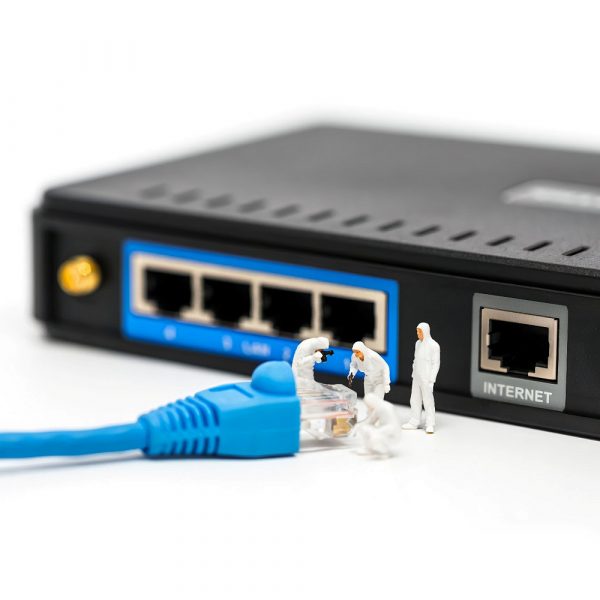RouteThis Claims Device Overload Overwhelming UK Bandwidth

A new study of live data from nearly 3,000 ISPs around the world, which was conducted by remote Wi-Fi diagnostics firm RouteThis, has claimed that broadband users in the UK and Ireland are facing “significant connectivity issues“, despite increases in connection speeds, due to “device overload overwhelming bandwidth“.
The limited analysis notes that upstream speeds have risen 185% and downstream speeds have risen 167%, but it doesn’t provide any solid figures of timescales to help give this the proper context. At the same time, it warns that “device upgrades and pandemic-related behavioural shifts have put greater demands on home Wi-Fi environments,” which is true (more people are now working from home etc.).
According to Jason Moore, CEO of RouteThis: “Every new device added to a home network competes for shared resources and increases the opportunity for a poor subscriber experience. Once a home network hosts more than six or seven devices, it’s likely that at least one device will suffer from a bad connection. Today, that is a common number because people have so many smart devices.”
Advertisement
At this point we’re going to pause to focus on the claim that a home network hosting more than 6-7 devices is likely to have “at least one device … [that] will suffer from a bad connection.” Sadly, the press release contains no supporting context or analysis to back up this claim, or the wider claim of “device overload overwhelming bandwidth in UK and Ireland“.
Perhaps back in the early days of first-generation copper line ADSL broadband and 802.11b/g WiFi such a claim might have had some merit, but today? Yours truly is currently using a fairly low to mid-range sub-£100 router, which is connecting around 50-60 different devices on an FTTC line, and none of them has what I’d call a “bad connection.” The same was actually true back in the old ADSL days, when 10-15+ devices was more the norm.. for me.
Part of the problem here may be that they haven’t completely defined what they mean by “bad connection” or whether it’s intended as a reference to the WiFi / local network side, or the broadband connection. Naturally, it is very possible to saturate the broadband pipe through multiple devices, especially on slower lines, but most of the time they aren’t all trying to do that simultaneously and if you do then all devices will suffer – not just 1 out of 7.
The bulk of live devices that you connect to a home network will instead spend most of their time sitting idle, or sipping small bits of bandwidth, until they’re really needed. But saturating the broadband line is not a WiFi or router problem, and if ever the WiFi does become a bottleneck, then you can always upgrade to a more capable Mesh WiFi system.
Advertisement
The announcement goes on to state that “up to half of support engagements for ISPs can be traced back to problems with the home Wi-Fi setup“, thus ISPs can “dramatically reduce costs and improve customer satisfaction by helping to prevent these problems, and by diagnosing and resolving them more efficiently.” Another option, we’d suggest, is to simply supply customers with a good wireless router or mesh system from the start.
According to RouteThis, about 25% of diagnostic scans reveal that there is a less congested Wi-Fi channel available and 30% indicate an underlying problem of signal strength. Except, modern routers and WiFi standards are often specifically designed to make automatic decisions about the best channels to use, particularly in a congested environment, so some of these findings may simply reflect the way those systems’ function.
Likewise, some WiFi devices will always sit at the edge of coverage (unless you have a good Mesh system), where the signal is weaker, but this doesn’t necessarily mean that those devices won’t still work (not all devices are data hogs). Clearly there are some vested interests at work here. The “analysis“, such as it is, does make some fair points, but its other claims need to be backed up by proper data and context. We did ask, but received no reply.
Mark is a professional technology writer, IT consultant and computer engineer from Dorset (England), he also founded ISPreview in 1999 and enjoys analysing the latest telecoms and broadband developments. Find me on X (Twitter), Mastodon, Facebook, BlueSky, Threads.net and Linkedin.
« Quickline Refreshes Brand, Moves HQ and Set to Double Staff






















































So, blaming the customers for using the service they pay for!
But in most cases the ISP is supplying what is being sold. The end user, albeit unintentionally, can often be the problem.
Pure coincidence that they have a product to sell that claims to fix these problems?
Modern internet usage isn’t what it was 20 years ago, we now constantly need multiple connections to different IP’s from numerous devices in our homes. Sadly the majority of ISP supply cheap routers with insufficient processors inside them that are incapable of being up to the task in 2022.
Because the cost of internet packages in this country leave very little for the included router.
20 years ago I was still on a 3Mb/s ADSL service, well 3Mb/s if I was lucky. If there is a family in the house and you are getting 2-3 people watching 4k video at the same time or using other high bandwidth services, then yes there is a problem with bandwidth, since a lot of people are still using FTTC at speeds of around 40 Mb/s if not less.
I have a load of stuff connected to my router, but most are just sitting there, slurping and odd bit of data now and again. The two that would use the most data is my computer and my TV as I only use it for online content,
Not enough people shopping for a new broadband contract consider the quality of the ISP supplied router. I’m with Vodafone and they have multiple versions of the same router, each of which have varying capabilities due to the difference in chipsets.
I personally don’t believe it’s worth the expense and effort of buying your own router instead of using the ISP supplied router, as long as it works OK.
I use Fing to monitor my network and typically see 25 live connections out of 50 devices at any one time. I use the standard Sky Hub router (SR203) and its performance is good enough that I have decommissioned my Orbi Mesh network and Asus GT-AC5300 gaming router. The router is at the front of the house and I can stream 4k from the bottom of the garden.
I do appreciate that some ISP supplied routers are less than stellar, which is why I was compelled to buy the alternative solutions before the SR203 arrived. I am quite happy to no longer need them.
I also appreciate that plenty of people can’t distinguish between WiFi and broadband and stuff their routers in cupboards or behind the TV. Then they moan about their broadband when it’s their WiFi at fault – through their own actions. And do they check for channel interference? Probably not.
Absolute nonsense. I had 4mb broadband and had the same number of devices attached as when I got 900mb. When the 900mb was running speed tests of 80mb they tried telling me it was the number of devices attached, even though they were sat dormant. Unplugged every device, airplane mode for phones and tablets and got same speeds. They escalated a visit and, quelle surprise, half hour later the speeds went back up.
Robot staff at the call centre haven’t a clue beyond their crib sheet.
To be fair to the ISP, if you were running the company and 99/100 people who complained about that thing were caused by the internal setup, you’d be telling front line advisors to do exactly what you got told to do.
Plug you computer into the router, unplug all other devices and turn the WiFi off – then run a speed test?
That does the same for a lot less pain.
But the problem is that the call centre script is not structured around the tech literate amongst us.
Hopefully when Speedtest type software in the router is more common, this won’t be such an issue as the test can be run at source?
I just wish people (advertisers) would stop conflating the internal network (or WiFi) with the broadband connection, e.g. “Unbreakable Wifi”, or ultrafast that “connects 100 devices in your home”.
Remote WiFi diagnostics firm publishes study supporting the need for their products using an unknown subset of data from users that likely had issues.
I seriously doubt that many users are seeing issues due to device count. The overhead per device is not zero but shouldn’t make much of a dent on AC WiFi.
Typical blabber from people that claim to know what they’re talking about. 6 or 7 devices streaming video content will happily live off a typical 60 Mbps fttc connection, even when connected via the crappy Wi-Fi router most isps supply (speaking from experience). Unless you have a use case where tens of devices make 100s of connections each, Mr Moore’s argument is invalid and quite wrong at that. Even more so when talking about IoT devices, where your biggest worry is the crappy 2.4ghz radio they’re equipped with, rather than actual bandwidth available on the router.